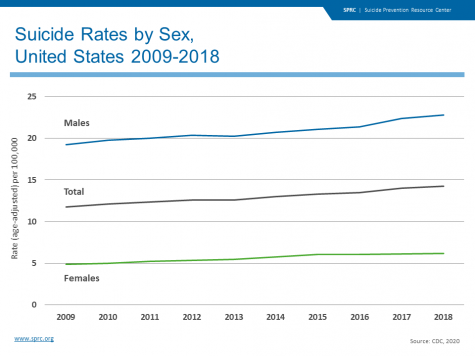By Sage Brislen | Writer
September 20, 2020
The prominent stigma surrounding mental health impacts society in ways we may not even realize, which makes providing support and education about mental health in public media extremely important. Many have taken to social media to recognize September as National Suicide Prevention Month, posting steps to check in on loved ones and tips to avoid unsafe emotional coping mechanisms.
Suicide prevention education efforts seem to have heightened this month after the death of Ronnie McNutt. On August 31, the thirty-three year-old army veteran took his own life during a Facebook live in front of his friends and family. The video wasn’t taken down fast enough to prevent it from being shared tens of thousands of times.

The suicide rate of men measured in 2018 was almost four times higher than that of women. Perhaps some kind of social disconnect within this group creates the noticeable gap, which makes this discussion essential for an adolescent audience.
“It needs to be talked about more. It’s nobody’s fault—it’s just the way society is and it needs to change,” senior Ian Riley said. “I don’t get much support, I’m usually just made fun of or told to ‘deal with it.’ I’ve heard it from my doctor, he said the amount of anxiety I have is not normal for a kid my age.” No medical action was taken after the comment.
“I feel like I’m bottling up my emotions because I’m not accepted,” he said. “I’d like to see more people listening and just being there for people who want to talk.”
The resources accessible to students at SCHS should be well-known and ensure that students don’t feel like a burden when reaching out. The first step is to seek help from others, whether it’s a family member, a friend, or a professional (such as a school counselor, hotline, or therapist). Every person’s mental health, no matter their mental state, should be recognized. So please, don’t be afraid to speak—there will always be someone willing to listen.
Crisis Text Line: Text CONNECT to 741741
National Suicide Prevention Hotline (24/7): 1-800-273-8255
Safe Alternatives (Self-Injury Hotline) (24/7): 1-800-366-8288
Mental Health – CUSD Student Support Services – School Loop
Counselors’ Office (by the little theater): LT6 Shiree Webb (for last names A-K),LT4 Erika Fairweather (for last names L-Z)

Leave a Reply